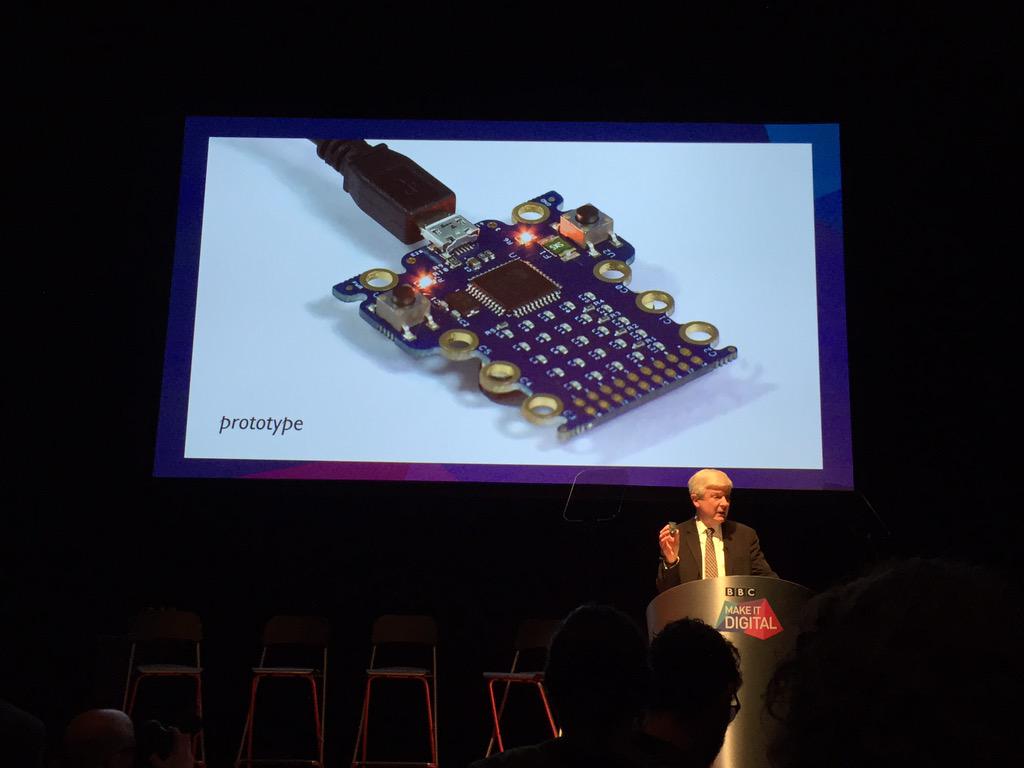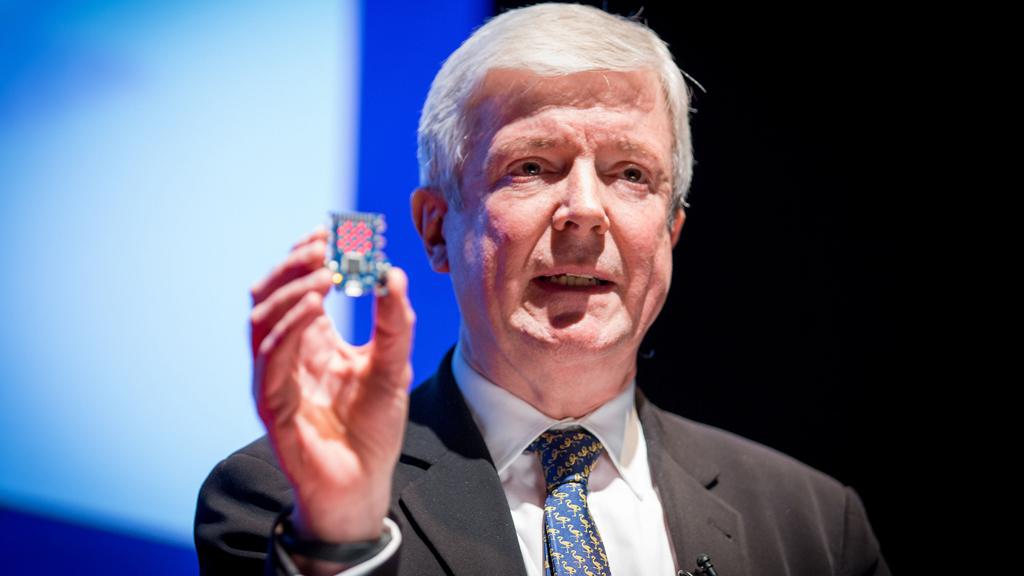Hello Microbit
March 28, 2015 at 07:38 PM | categories: C, microbit, arduino, BBC R&D, blockly, work, BBC, C++, microcontrollers, python, full stack., full stack.D, webdevelopment, mbed, kidscoding | View CommentsSo, a fluffy tech-lite blog on this. I've written a more comprehensive one, but I have to save that for another time. Anyway, I can't let this go without posting something on my personal blog. For me, I'll be relatively brief. (Much of this a copy and paste from the official BBC pages, the rest however is personal opinion etc)
Please note though, this is my personal blog. It doesn't represent BBC opinion or anyone else's opinion.
Just over 2 weeks ago, the BBC announced a small device currently nicknamed the BBC Micro Bit. At the launch event, they demonstrated a prototype device:


The official description of it is this:
BBC launches flagship UK-wide initiative to inspire a new generation with digital technology
The Micro Bit
A major BBC project, developed in pioneering partnership with over 25
organisations, will give a personal coding device free to every child in year 7 across the country - 1 million devices in total.
...
Still in development and nicknamed the Micro Bit,* it aims to give children an exciting and engaging introduction to coding, help them realise their early potential and, ultimately, put a new generation back in control of technology. It will be distributed nationwide from autumn 2015.... The Micro Bit will be a small, wearable device with an LED display that children can programme in a number of ways. It will be a standalone,
entry-level coding device that allows children to pick it up, plug it into a computer and start creating with it immediately.
...
the Micro Bit can even connect and communicate with these other devices, including Arduino, Galileo, Kano and Raspberry Pi, as well as other Micro Bits. This helps a child’s natural learning progression and gives them
even more ways of expressing their creativity.
...
Early feedback from teachers has shown that it encourages independent learning, gives pupils a strong sense of achievement, and can inspire those who are not usually interested in computers to be creative with it.
For me, the key points about the prototype:
- Targetted at children, and their support networks (teachers, parents etc). This is reflected throughout the system. It doesn't underestimate them though. (I work with cubs and scouts in my spare time, and I know they're much willing to try than adults - which means they can often achive more IMO. Especially at scout age)
- Small programmable fun device, instant feedback, with lots of expansion capability with a gentle gradual curve.
- Web based interfaces for coding, as well as offline interfaces
- Graphical, python or C++ code running on the device
- Designed to work well with other things and hook into larger eco-systems where there's lots of users.
(That's all public information, but for me those are really the key points)
Aside from the obvious -- why did the announcement excite me? Simple: While it wasn't my vision - it was Howard Baker's and Jo Claessen's, I implemented that Microbit prototype and system from scratch. While an earlier iteration had been built and used at events, I was asked to build a prototype we could test in schools and to take to partners to take to scale. (I couldn't work from that earlier iteration, but rather worked from the source - Howard and Jo. It was a harder route, but rewarding)
For those who recognise a similarity between this and Dresscode which I blogged about last summer, the similarities you see are co-incidental. (I was clearly on the same wavelength :-) ) While Microbit was in a early stage pre-prototype phase there, I hadn't seen it.
My thinking behind Dresscode though, was part of the reason I jumped at the chance to help out. It also mean though that some aspects I had a head start on though, and in particular, the IOToy and Guild toolsets I developed previously as part of some IOT work in R&D came in handy in building the prototype.(That and the fact I've used the arduino toolset a fair amount before)
Anyway, as I say, while I can't say much about the project, but it was probably the most intense development project I've worked on. Designing & building the hardware from scratch, through to small scale production manufacture in 3 months, concurrent with building the entire software stack to go with it - compilation toolchains, UIs and so on, AND concurrent with that was the development of detailed documentation and specs for partners to build upon. Intense.
In the last month of core development I was joined by 2 colleagues in R&D (Matt Brooks and Paul Golds) who took my spike implementations of web subsystems and fleshed them out and made them work the way Howard and Jo wanted, and the prototype hardware sanity checked and tweaked slightly by Lawrence Archard. There was still a month of development after that, so it was probably the most intense 4 months of development I've ever done. Well worth it though.
(Regarding names, project names change a lot. While I was building our device in even that short 3 months, it got renamed several times, and since! Don't read too much into names :-) Also, while it does fit anywhere else, it was Fiona Iglesias who was the project manager at the time who asked me if I could do this, and showed a great leap of faith and trust when I said "yes" :-) Balancing the agile process I needed to use against the BBC being very process driven (by necessity) was a thankless task!
Finally some closing things. On the day of the launch I posted a couple of photos in my twitter feed, which I'll repeat here.
The first was my way of going "yay". Note the smiley bit :-)
So, look what I made! http://t.co/OTCn14YN7s Earlier revs were built on my kitchen table :-) pic.twitter.com/2k9a2UBOZh
— Michael (@sparks_rd) March 12, 2015The second related to an earlier iteration:
Earlier iteration: pic.twitter.com/bmQ2G7KK2t
— Michael (@sparks_rd) March 12, 2015Anyway, exciting times.
What happens next? Dunno - I'm not one of the 25 partners :-)
The prototype is very careful about what technologies it uses under the hood, but then that's because I've got a long history of talking and writing about about why the BBC uses, improves and originates open source. I've not done so recently because I think that argument was won some time ago. The other reason is because actually leaving the door open to release as open source is part of my job spec.
What comes next depends on partners and BBC vagaries. Teach a child to code though, and they won't ever be constrained by a particular product's license, because they can build their own.
Anyway, the design does allow them to change the implementation to suit practicalities. I think Howard and Jo's vision however is in safe hands.
Once again, for anyone who missed it at the top though, this is a personal blog, from a personal viewpoint, and does not in anyway reflect BBC opinion (unless coincidentally :).
I just had to write something to go "Yay!" :-)